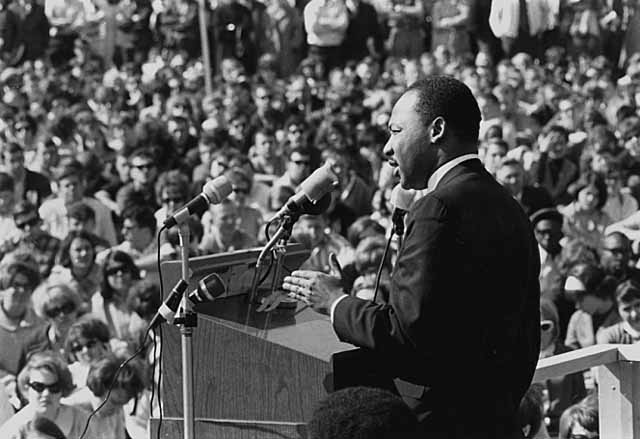For years, Gregory FCA has marked Martin Luther King Jr. Day with reflection and commitment to volunteer service. As we come of age as an agency, the holiday, the man, and the mission mean something different to us now.
We have grown from our Philadelphia roots to serve clients internationally from our offices in New York, Boston, and London. Each of these cities has its own character, and all of them share a portion of Dr. King’s lasting legacy. This year, we wanted to call out his work and lessons in the places we call home.
Confronting Barriers to Equity in Philadelphia
On November 19, 1950, while a seminary student at Crozer Theological Seminary in Chester, Pennsylvania, Dr. King attended a lecture by Dr. Mordecai Johnson at the First Unitarian Church of Philadelphia. This lecture on Mahatma Gandhi’s principles of nonviolent resistance profoundly influenced Dr. King’s adoption of nonviolence in his activism.
A decade and a half later, Dr. King would speak at a rally outside the gates of Girard College, a then-segregated school in Philadelphia. He condemned the exclusion of African American students, and his involvement was pivotal in the efforts to desegregate the institution.
And in 1967, Dr. King delivered an address in Philadelphia at the 50th anniversary of the Women’s International League for Peace and Freedom, emphasizing the interconnectedness of peace and civil rights.
Bridging Movements in New York
New York City was a stage for Dr. King to expand the reach of his message and show how it intersected lines of race and class. On July 18, 1957, during Billy Graham’s evangelistic crusade at Madison Square Garden, Dr. King delivered an address emphasizing the importance of spiritual renewal in the fight for civil rights.
He would speak again at the New York City Bar Association about the legal history of the Black Freedom Movement and at Carnegie Hall to honor the 100th birthday of W.E.B. Du Bois. In 1967, he would make one of his defining addresses, the “Beyond Vietnam” speech that cemented the bond between the Civil Rights movement to the broader cause of peace and economic justice.
A Foundation of Purpose in Boston
To say Boston played a formative role in Dr. King’s life is an understatement. While pursuing his Ph.D. at Boston University, he met Coretta Scott, his future wife and partner in the struggle for civil rights. Here he would complete his Ph.D. on June 5, 1955, with a dissertation titled “A Comparison of the Conceptions of God in the Thinking of Paul Tillich and Henry Nelson Wieman.”
Later, in 1965, Dr. King led a march from Roxbury to Boston Common to protest de facto segregation in Boston’s public schools. This event marked the first time Dr. King led a march in the northern United States, highlighting the pervasive nature of racial inequality beyond the South.
Global Solidarity in London
Dr. King’s visits to London highlighted his belief in the universal fight for justice. In 1964, en route to receiving the Nobel Peace Prize, he addressed an audience at St. Paul’s Cathedral, emphasizing the interconnectedness of struggles against oppression worldwide. His support for the anti-apartheid movement and engagement with international audiences underscored the global dimensions of civil rights.
There is a lot for any communicator and leader to admire in the work Dr. King did in these four cities. He built coalitions, acted with clarity and transparency, and stood by his convictions. His example is a challenge to us to act responsibly and contribute, in what ways we can, to a more just society.
